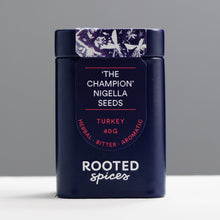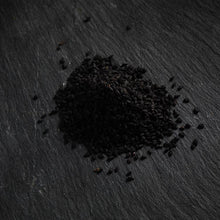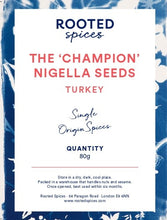- INFO
- RECIPES
- ORIGIN
- STORAGE
- HEALTH
“Why ‘The Champion’ Nigella Seeds?” I hear you ask.
Well, the name ‘Nigella’ means ‘champion’ – which we thought was fitting, seeing as Nigella Seeds are the champion of all herbal medicines and the unsung hero of the spice rack.
These little black seeds mightn’t look much, but they are such a quick and easy way to elevate a salad, roast vegetables, simple breads. They pack a bitter-onion punch and are traditionally found flecking Peshwari naans, pilaf rice, filo tarts as well as braised kormas and chutney.
The Prophet Muhammad described Nigella Seeds as a “remedy for every disease except death” and their latin name, panacea, roughly translates as ‘cure all’. Luckily, this finishing spice couldn’t be easier to incorporate into dishes, so start reaching for them a bit more often and give yourself a delicious boost.
ALSO KNOWN AS: kalonji, charnushka, Middle Eastern Poppy Seeds
Cheddar and Nigella Seed Biscuits
Whipped Ricotta Toast with Roasted Vegetables and Nigella Seeds
We import our Nigella seeds from Turkey. The inky blue flowers, which look a little like Love in a Mist, are harvested late-summer, when the pods are gathered and crushed and the seeds collected.
Nigella seeds should be stored in a dark, airtight container, to prevent them from losing their beautiful jet black colour and delicious flavour.
The Latin name for Nigella Seeds (panacea) roughly translates as ‘cure all’, and they are still referred to as a ‘miracle herb’ worldwide. Nigella seeds have wide-ranging therapeutic properties such as treating rheumatism to curing kidney stones, as well as possessing anti-inflammatory properties. For more information, click HERE.






